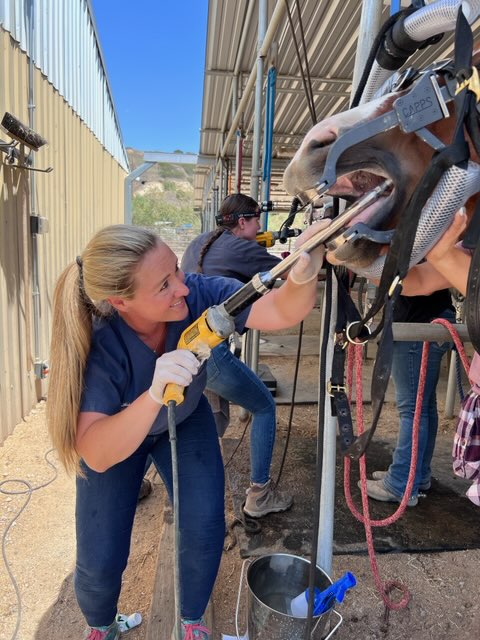Dentistry
Equine dentistry is an important aspect of your horse’s wellness. Poor dentition can cause a variety of problems, including poor weight gain or maintenance, choke, and bitting or performance issues.
Horses have specialized teeth that erupt from their gumline over the course of their life. Horses also chew in a circular pattern, which means that over time, they will create sharp points on the outside of their upper teeth and the inside of their lower teeth. If left unaddressed, these points can become sharp enough to cause ulcerations on the tongue and cheeks.
Young horses will have a large amount of dentition changes in the first 5 years of their life, and may need to be evaluated as often as every 6 months.
Older horses also have increased dental needs as well, as their teeth wear down and have potential changes to the chewing surface of their teeth.
We recommend that adult horses have a dental evaluation as a part of their annual wellness check.
A dental evaluation will allow your veterinarian to assess your horse’s dental health including the presence of sharp points, hooks or ramps in your horse’s mouth, any cracked or broken teeth, the presence of periodontal disease, and any other abnormalities in the anatomy of your horse’s mouth – all of which can affect your horse’s overall comfort, health and nutrition. A complete dental evaluation is typically done under standing sedation with an oral speculum that allows your veterinarian to examine your horse’s entire oral cavity – from their incisors all the way back to their very last molars.
Your veterinarian can then float your horse’s teeth – this procedure allows your vet to use a powered tool to file down the sharp points and correct irregularities of your horse’s teeth.
Many dental abnormalities can be fixed in the field; however, some complicated extractions and dental corrections may require referral to a surgical facility for treatment.
***It is extremely important to note that the only person who should be evaluating your horse’s mouth and performing any kind of dental procedure is a licensed veterinarian. Lay-dentistry, or dentistry done by anyone other than a licensed veterinarian, is illegal. Be very wary of anyone marketing themselves as an “equine dentist” who is not also a veterinarian. Dentistry not done with the proper equipment, tools and knowledge under proper sedation can end with disastrous results at worst, and an improper float at best***
